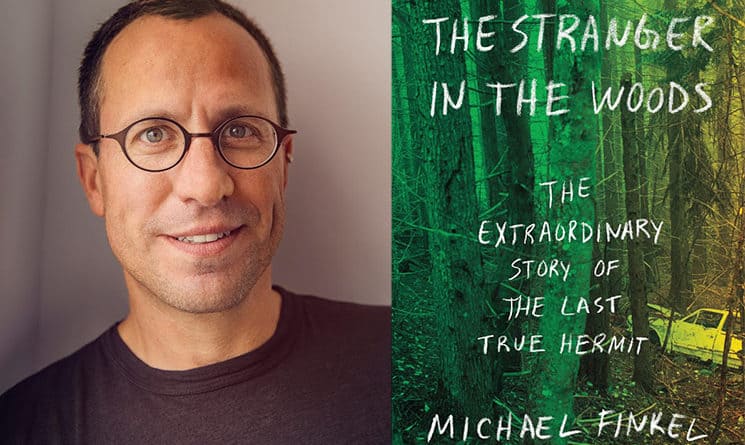NOTE: Due to the expected storm on Tuesday, author Michael Finkel’s event at The Music Hall Loft has been moved to Monday, March 13, at 7 p.m.
When Christopher Knight walked into the Maine woods without a compass, map, or backpack, Ronald Reagan was president and the world was reeling from the Chernobyl nuclear disaster. It was the dawn of the digital age, and the 20-year-old Knight seemed poised to enter it. He’d finished an electronics course at a Massachusetts tech school and had a job installing alarm systems near Boston.
But that spring, in 1986, Knight decided he wanted out — out of his job, out of the city, out of modern life. He wanted to be alone. So he drove, first south to Florida and then back north to his home state of Maine. He traveled from main roads to back roads to country roads to logging roads until, finally, he parked his car and vanished into the woods.
Twenty-seven years later, Knight was dragged back into society. Caught breaking into the kitchen of a summer camp in the North Pond region of central Maine, Knight was arrested. The officers who arrested Knight quickly realized this wasn’t a simple burglary; in fact, Knight was the legendary “North Pond Hermit,” the phantom figure who’d been stealing food, clothes, batteries, mattresses, and other sundries from vacation homes around North Pond for almost three decades. Knight claimed he’d never had a campfire, never slept indoors, and never spoken to a single person in that time.
For journalist Michael Finkel, the most fascinating part of Knight’s story was that he stole books. Thousands of books, from Shakespeare, “Ulysses,” and other literary tomes to popular paperbacks. Finkel, a writer and outdoorsman himself, couldn’t stop thinking about Knight’s story.
“It was that weird detail about stealing books that threw it into an obsession,” Finkel says.
That obsession led Finkel on a pilgrimage to the Maine jail where Knight was in custody and, later, to Knight’s secluded campsite. He wrote an article for GQ about Knight in 2014, and that feature became the foundation for “The Stranger in the Woods,” Finkel’s newly published chronicle. The book serves as an examination of why and how we seek solitude.
Finkel will read from the book and talk about Knight at The Music Hall Loft in Portsmouth on Monday, March 13.
“I think I must be a little bit of a masochist to choose for the topic of a book someone who was the absolute most difficult person to talk to,” Finkel says. “The liveliness of his mind and the phenomenal uniqueness of his story hooked me, but I’ve been a journalist for more than 25 years, and this challenged me on every level.”

Michael Finkel photo by Christopher Anderson Magnum Photos
Through a series of jailhouse interviews, Finkel got to know Knight and learned how he survived the harsh Maine winters. Despite the romantic images of a hermit huddled in the wilderness, Knight had actually built a complex camp on a patch of land obscured by thick trees and massive boulders. He had systems for food storage, cooking, washing, and waste disposal. Though alone, he was never far from civilization. Knight’s secret camp was on private property, and burglaries of nearby vacation cottages supplied him with food, blankets, and whatever else he needed to survive.
As part of the reporting process, Finkel found Knight’s campsite and slept there on five separate nights. At first he was baffled that someone who professed to love solitude and nature would choose to spend a quarter-century on a couple hundred yards of private property surrounded by roads and houses. But then he saw the site.
“It is this incredible, peaceful, gorgeous … calming place,” Finkel says. “After finding it for the first time, I craved going back there.”
Using Knight as a hook, Finkel delves into the history of hermits and other solitary mystics in “The Stranger in the Woods.” Knight himself rejected the idea that he had some special insight to offer. But seeking solace in the woods — and seeking wisdom from those who cut themselves off from society — is a cross-cultural tradition, according to Finkel.
“Human history goes back 5,000 years, and people have always been going back to hermits, saying, ‘Please tell me what you learned.’ It’s obviously some kind of primal fascination we have, and I fully admit I’m subject to that fascination,” he says.
After years of research, Finkel only scratched the surface of Knight’s motivations. He initially wrote Knight a series of letters — written by hand, because Finkel had a hunch Knight would only respond to a hand-written note — and the two developed an uneasy rapport. Finkel shared his own failings. He’d been fired from New York Times Magazine in 2002 after it was discovered he’d created composite characters for a story about the slave trade in Africa. Finkel wrote about the incident in his 2005 book, “True Story,” and being open about it helped him connect with Knight, who never hesitated to express remorse about the burglaries that helped him survive for nearly 30 years.
“It’s not the most comfortable thing to be open and exposed,” Finkel says, “but maybe instead of having this journalist-subject relationship where someone is talking down to you, you can look at each other across the table and on an even playing field.”

As “The Stranger in the Woods” makes clear, though, Knight is serious about solitude and finds relationships, at best, burdensome. In the book, Knight rebuffs Finkel and offers flippant answers. But underneath Knight’s curmudgeonly character, there’s a longing to connect, a tension between keeping other people at bay while also sharing his story.
“Here was a guy who didn’t want to talk to me at all, but he’s hyper-intelligent, possibly one of the smartest people I’ve ever encountered. Maybe too smart for our crazy world,” Finkel says.
The portrait that emerges in “The Stranger in the Woods” is complex. Some North Pond residents view Knight as a monster who robbed them not only of physical items, but of their sense of security; others think he is a liar and don’t believe he lived in the woods without a campfire (it would’ve given away his location, Knight says). Still others see him as a harmless eccentric.
“He’s a hero, he’s a villain, he’s pretty much everything in between,” Finkel says. “A lot of what makes this topic interesting is people’s reactions to Chris Knight. They say a lot more about who they are than who Chris Knight is. What do we do with humans who are not evil, not terrible people, but are just different? … He’s such an outlier, and we don’t have space for that in the modern world.”
Knight completed his court-ordered punishment two years ago, and Finkel hasn’t heard from him since their final conversation in 2015. “The Stranger in the Woods” may be Knight’s only testament.
“The way we left it is that if he wanted to get in touch with me, he’d write me a letter. I promised him I would not bug him, and I’m going to fulfill that promise,” Finkel says. “I think he’s doing OK. He definitely wants to be left alone. I think his reaction to the book is that I wrote every sentence with precision and care. I wrote exactly as I felt it, and I could do no more, and I know for a fact he’d respect it, which is more important than liking or disliking it.”
Michael Finkel will read from and discuss “The Stranger in the Woods” at The Music Hall Loft on Monday, March 13, at 7 p.m.

